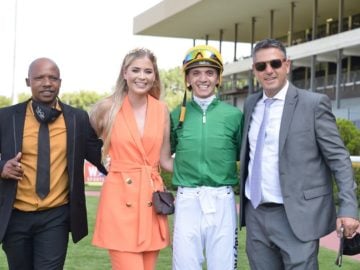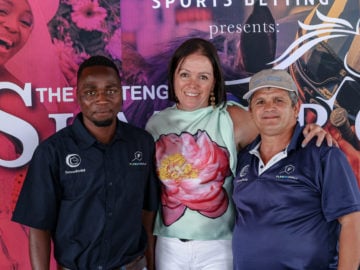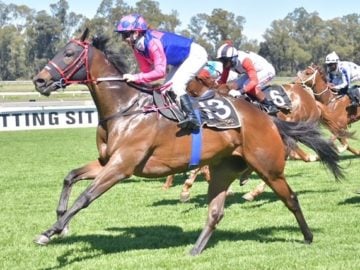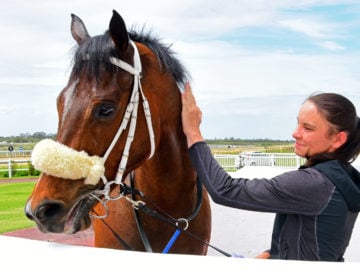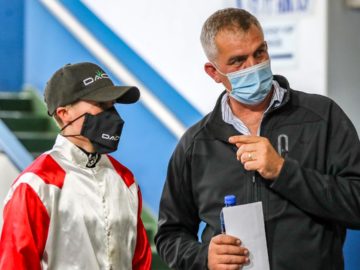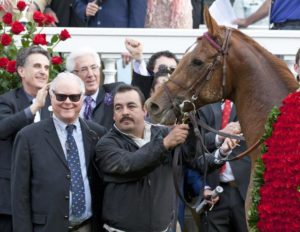 Barry Howard Irwin is the founder and CEO of Team Valor International. A racing journalist, successful bloodstock agent, owner, breeder and above all, racing enthusiast, Barry has embraced and helped promote the South African Thoroughbred like few others. We caught up with him on his recent visit to the National Sales.
Barry Howard Irwin is the founder and CEO of Team Valor International. A racing journalist, successful bloodstock agent, owner, breeder and above all, racing enthusiast, Barry has embraced and helped promote the South African Thoroughbred like few others. We caught up with him on his recent visit to the National Sales.
Tell us a bit about Barry Irwin – where were you born, where did you grow up and go to school and what were your early interests?
I was born in Southern California, where I grew up and lived most of my life until moving in 2000 to Kentucky to a) be living with other people in the horse industry and b) to get out of California, where I didn’t like the direction the sport was going in. Subsequent events proved this to be a good decision for me.
Were / are you a rider or how did you develop an interest in horses?
I grew up loving the finish line. First it was human racing, then it was the equine equivalent. My dad, my brother and I all ran track. All I ever cared about as a kid was running and watching others run, including horses. I never rode, but I did make my poor grandparents drive me great distances to look at horses and whinny and snort to them in an effort to get a response. I started going racing and betting on horses at age 7. By age 9 or 10 I was totally involved in the sport.
You were a journalist for many years and contributed to some of the biggest racing publications – tell us a little about your experience, what you learnt, the opportunities it offered and how it shaped your thinking? Who were / are the people you admire most?
I began at The Blood-Horse, then edited The Thoroughbred of California and finally wrote a syndicated column for Daily Racing Form. I loved The Blood-Horse. The editor, Kent Hollingsworth, remains my idol in racing. I left the other publications because they were nothing more than glorified house organs and I wanted to be a journalist. For the last 20 years or so I have contributed Op-Ed pieces for the TDN (Thoroughbred Daily News) and the Paulick Report. I don’t accept payment. I write about what is on my mind. I have been one of the sport’s longest and staunchest advocates for the elimination of race day drugs in our part of the world. We have not yet won the fight, but we are getting close to some resolution. The best part about being a writer in the beginning for me was that it gave me daily access to the greatest players and minds in the game and I asked some very famous people a lot of questions. To be honest, I drove some of them mad, but I learned a lot about what interested me.
I believe Swaps is your all-time favourite racehorse – why that particular horse?
I was 12 and 13 when he was racing and I lived where he ran. He captured all Californians’ imagination when he was able to topple the kingpin of the East Coast establishment in Nashua. California horses were considered substandard. They still are! I loved Swaps and still do for his efficiency of movement and his mechanical rhythm. He is to this day the absolute best moving horse I have ever seen anywhere. He broke countless track, course, American and world records on dirt and turf. And he was a terrific looking sucker to boot!
Tell us how Team Valor came about (and also, how you chose the name)?
My first racing stable, established in 1987, was named Clover Racing Stable. In a 5-year span we won a Breeders’ Cup and a Santa Anita Handicap (the race Seabiscuit made famous). In 1992, 2 of the 4 partners declined to contribute some badly needed funding, so Jeff Siegel and I one day just formed Team Valor and let the other stable run its course. I named it Team Valor because the one quality I admire most in the Thoroughbred is courage under fire, which is valor. I also designed the silks, the crimson color of the flare of horse’s nostril against the green battlefield of the Turf.
You obviously have an in depth interest and love for bloodlines and you are known for having a taste for ‘unusual’ and ‘foreign’ bloodlines in particular – tell us a little about your philosophy as to what makes good performance bloodlines? You have also famously made some very shrewd yearling buys. Without giving away any trade secrets, how do you choose yearlings?
I do like bloodlines when I am planning matings or buying a horse that has already raced, but when I buy yearlings I do not look at pedigrees until after I have seen the individual. For me, the individual trumps the bloodlines, which is why I don’t bring a catalogue to the yearling sales. After I find a yearling I like, I will look at the pedigree to see if the physical type matches what it is supposed to look like on paper. When I bought Captain’s Lover for instance, I bought her body, not her bloodlines, because Captain Al was just starting off and he did not resonate with this foreign buyer.
How big is the Team Valor operation? We see some pretty big breeders, owners and trainers, but you seem to have a smaller, more concentrated operation and you spread your interests across a number of countries, trainers, farms – why is this ?
Right. We’ve never had more than 8 broodmares of our own and we have bred many Group and Graded winners around the world. Many are from unfashionable bloodlines. One of my best producers is a Western Winter mare named Ginger Sea. Her family is non-existent, but she is so incredible looking—much my best conformed mare—that she has delivered a Graded winner and another Graded placed as her first foals to race. We race throughout Europe, South Africa, the United States and Australia. We have about 40 in training. We are selective when we buy, which is the key. And we use trainers that we can trust and that don’t cheat with drugs. This is very, very important to me. I want to win clean or not at all.
How do you select a trainer? With a number of different horses spread across a number of different countries, how do you manage all of that? Are you a very hands-on owner?
I choose a trainer based first on his talent and secondly his honesty. I want to know everything good and bad that goes on. I don’t tolerate trainers that hide things from me. And, above all, they have to be honest about drug use. If a trainer is talented and straightforward, I don’t interact much with him. If he is the opposite then I am in his face and will drive him crazy.
There’s an expression that a good 2yo seldom makes a good 3yo. What, if any, are your philosophies on breeding and / or producing precocious juveniles ?
A good 2yo does not have to be a precocious juvenile. I have had a few youngsters that have not trained on, but for the most part, I don’t buy horses just to race them at 2, so because of that most of our good youngsters have trained on.
If you happen to end up with a precocious type, how do you plan its career?
Make the most use of it as possible as early as possible. Our Champion 2yo Carnadore was a good example of this.
Surfaces are a hot topic here at the moment and you have bred horses to run across multiple surfaces – do you have any specific preference, or is it ‘horses for courses’?
For racing I like turf first, dirt second and synthetics last. I like Tapeta more than Polytrack. I think these surfaces work when the track managers follow the dictates of the manufacturers. When they don’t, that’s when the surfaces do not work. For training I like dirt first, synthetic second and turf last. All weather tracks are best for training and not racing because they do not allow a horse’s foot to slide upon impact. This is know as the javelin effect and is bad for soundness.
You are very outspoken about your anti-race day medication stance. How / why did this develop and why do you feel so strongly about it? Do you think the US race day medication policies affect horses’ performance – both on the track, and later in the breeding barn in terms of the stud book?
In addition to my involvement in horse racing, my other favorite pastime is following athletics, or as we Yanks call them “Track & Field.” I absolutely love athletics because it is the purest of sports. But, like the miscreants that ruined the sport of cycling and put a crimp in long distance skiing and speed skating, coaches, doctors and managers enabled or encourage athletes to take PEDS (performance enhancing drugs), which tarnished the sport so much in the U.S. that except for a few instances, all of the major meets have disappeared. The sport lost its fans base. I don’t want that to happen to our sport. This is why I am so adamant against race-day meds. There is no proof that I know of that the use of drugs negatively impacts the DNA or the gene pool, but I can tell you that our horses that used to be the envy of the Europeans and the Japanese are now decidedly inferior. Can it really be a coincidence?
How easy is it to fly in the face of general opinion when the US is so pro race-day drugs and with their use being so prevalent, how do you find trainers to respect your wishes?
Last week I wrote what many people characterized as a scathing Op-Ed about our head of The Jockey Club in America. I took him to task for behaving like a hypocrite and acting out of weakness by backing weak measures to deal with the race-day medication issue. I received about a dozen e-mails in support of my position from the top owners and breeders in the game, but not one of them saw fit to send those letters in to the publication that ran my story. Is it a lonely battle? Of course it is. But I have always been more interested in the well being of our sport than winning any popularity contests. As for finding a trainer or trainers, most trainers love to train for me because I have good horses and I am always buying ready made new ones. Team Valor owns its own stable, has its own private trainer and operates completely independently of any racing association, so I am not vulnerable to the whims and vindictiveness of any racing association. This also allows me to say whatever I want whenever I want to. It is quite a luxury.
There has been a series of high profile articles recently (some of which have been acknowledged / rewarded by the Stan Bergstein writing turf writing contest that you have initiated) examining the use of race day drugs. The PETA video has also caused a bit of a stir – how accurate do you think these reports are and what do you think it says about the state of the industry as it stands as well as its future?
First of all, I have it on excellent authority that a second bombshell from PETA can be expected next week, which is the week of the Kentucky Derby, our biggest race and the time of the year that even the general public follows our sport. So the horse pucky is going to hit the fan again! I have written numerous articles as have others like Mr. Bergstein himself over the years and we have been able to move the ball a bit closer to the goal line, which is eliminating the use of drugs on race day. But the video generated by PETA has probably done much more to move racing in the right direction. Personally I hated the PETA video because I thought it took a lot of cheap shots and took many things out of context. But it was very ugly. The real question is this: are trainers going to acknowledge their dependence on drugs and give up the ghost before they have trashed our sport and it is too late. I am hoping that the good guys win and that the trainers come to their senses.
Tell us a little about the Stan Bergstein writing contest – how did it come about, how does it work and what do you hope to achieve with it?
Stan Bergstein was the biggest mover and shaker in the Standardbred industry and later in his life he wrote a regular column in Daily Racing Form, our equivalent of Sporting Post. Stan was a completely admirable and likeable human being who was respected by most folks. He and I for a long time were the only ones writing about the abuse of PEDS. When he died, I thought he left a void that needed to be filled, since Daily Racing Form decided not to replace him, most likely because they are in league with racing associations that don’t like what they consider to be bad publicity. So I put up $25,000 (more than 250,000 rand) of my own money to sponsor a writing contest that rewarded writers of stories written in the tradition and style of Mr. Bergstein. We have done it twice now and this year we have 5 prominent judges for whatever stories get nominated from the public or ourselves.
You have famously been a fan and supporter of our local industry for a number of years. How / why did you first ‘find’ South Africa? Why do you choose to shop here despite our export protocols and how do you feel our bloodstock compares (price and quality-wise) with the rest of the world?
My first South African horse was the gelding Delta Form, a Summer Cup winner trained by Mike de Kock. I bought him in partnership with ex-South African Gary Barber, who is now the CEO of MGM in Southern California. That horse won some nice races, including the Grade 2 Del Mar Handicap in record time. Then I was offered Ipi Tombe, fell in love with her and put together a team that consisted of the original owners from Zimbabwe, Team Valor and WinStar Farm of Kentucky. After our success with her, I decided to visit South Africa and attend the yearling sale. I enjoyed immediate success as a buyer of yearlings, as well as the occasional private purchase, such as Irridescence and Gypsy’s Warning. When I realized that one of my yearlings Captain’s Lover was a star in the making, I bought her dam with a filly at her side that I named Ebony Flyer.
I love the industry in South Africa. Does it have problems and is it a constant challenge on many levels? You betcha! But the value is here, the players are lively and enthusiastic and they are game and brave. I admire them and love competing against them. I think the top fillies from South Africa are as good as fillies anywhere and I think occasionally a colt can cut it in top international company. I like the fillies here better than the colts, as I do in most Southern Hemisphere countries except for Australia, which comes up with fantastic male runners. The export issue is a pain in the rump, but if it were easy, more people would be here to compete in buying the horses, so I have to take the bad with the good.
You have quite a vested interest in South Africa now, both with breeding as well as racing stock. Tell us a little about why you choose to support the local industry and to stand and race your horses here?
After I had developed a lot of black-type-winning fillies and mares, I put some of them into production. We now have 15 mares, all but one of whom earned or produced black-type. I think the most effective way of earning money in your industry is by marketing well-bred, well-conformed yearlings and sell stock abroad. Well, I want to consume stock good enough to go abroad and I want me and my partners to participate in earning income from the sale of yearlings. When we put a yearling in a sale, it there to be sold, not to be played games with.
Around this time last year there was a letter that seemed to indicate that you were not all that satisfied about the way you / your horses were looked after here. Has that been resolved?
It has not been resolved, but I am working on it. Being critical but constructive, I think that there is a lack of investment and unwillingness by owners to spend enough money on the well-being of their horses. In America, we usually scope every horse that runs, because if you don’t do it, you won’t know if your horse bled or had mucous in its respiratory tract. God only knows have many top horses have been ruined because somebody is too cheap to pay for this practice. You have air pollution issues from smog in Johannesburg and pollen in Cape Town. When these conditions cause bleeding from the nostrils on a wide basis, racing needs to be stopped for the day to protect the horses. These are just a few examples.
Vet bills are something of an industry bug bear in South Africa – how do you find ours compare to medical bills in other countries?
Please don’t make me laugh. Your vet bills are nothing compared to other racing locales. If you want your horses looked after you must have them properly evaluated and treated.
Racing is a leisure pursuit for most. With so much on the go, do you still enjoy your racing and what aspect do you enjoy the most?
I like uncovering diamonds in the rough and developing a top horse. I have hired people to do the rest of what it takes to operate my enterprise.
What do you enjoy least ?
Bullies that push people around to maintain the status quo, turf writers with agendas and racing presenters that are too lazy to do their homework and fill the airwaves with nonsense.
What has been your greatest moment / sense of achievement as an owner and breeder?
The whole Kingdom experience, from buying his sire Leroidesanimaux as a racehorse before he became a Champion and went to stud, to buying his dam Dalicia in Germany and mating her with Leroidesanimaux, to offering AK as a yearling for a breeding partnership to buying him for a racing partnership, and managing his career that included winning the top prize in America (Kentucky Derby) and the richest race in the world (Dubai World Cup). I also was not inconvenienced when we sold him for a lot of money. I love that horse. He was and still is wonderful.
What gets you out of bed in the morning? Is there any ultimate goal that will fulfil all your aspirations as an owner and a breeder?
I would just like to keep doing what I do. I get a lot of satisfaction out of what I do.
Tell us a little about Visionaire and why you chose to send him to South Africa? Are you happy with what he’s produced so far and what you’ve seen of his progeny at the sales?
I loved Western Winter. Bought his stock and bred to him. But he got a lot of horses with imperfect front limbs. I brought Visonaire over here because is so correct in front, stands 16 hands 1 inch or more and he has a deep girth. I want to see if we can develop another Western Winter from the same sire line so that I can breed to him on my own shares instead of having to pay a lot of money like I did with Western Winter.
All over the world, horse racing as a sport and an industry, seems to be in contraction. How do you see racing developing, or perhaps a better question might be, how would you like to see racing change and develop?
Because of the way the sport has been trashed in many locales, it deserves to contract and, in some locales, disappear. Racing has to be fun and make people feel good about horses. Betting will always be there. But we need to improve the integrity of racing and have less daily races and more big weekends and festivals. England offers a good example of what racing should be like and so does Hong Kong and Japan and Australia. It must be special not drudgery.
American racing jurisdictions are famously fragmented, with each track seemingly independently run and each state having individual rules. This is quite different to the South African model where we have 2 operators running everything under a joint rule book and one set of medication rules. Advantages / disadvantages to either / both?
Both locales have many, many serious issues that threaten their very existence. I think owners need to assert themselves to run racing. Racetracks and racing associations have too much input.
South Africa still has a system that accommodates both a tote and independent bookmakers – what do you think of this as a model? There’s no such thing as perfect, but are there any racing jurisdictions around the world that you consider coming close to being an ideal model?
There is absolutely no reason to have bookmakers. They suck the life out of racing where ever they operate.
What are your thoughts on the South African handicapping and race programming system compared to the rest of the world?
I think the dumbest thing happening in your racing is the burden placed on a maiden winner in subsequent races. If somebody is lucky enough to breed a good horse, they should not be penalized for it. I also think that if you had claiming races on a large scale you would get more owners and the racing would be fairer. Money counts so classify with money not theories on ratings.
African Horse Sickness is obviously a burning issue for all in the South African community. How are we perceived by the outside world and what is the outside opinion on the disease and the danger it poses to the world?
Everybody knows about it but they also think you guys are trying to come up with some viable solutions.
And lastly, with racing a pretty all-consuming pastime, what are your interests outside of racing?
Writing, golf, track and field, reading, going to flea markets and collecting art, mostly sporting art.
‹ Previous




